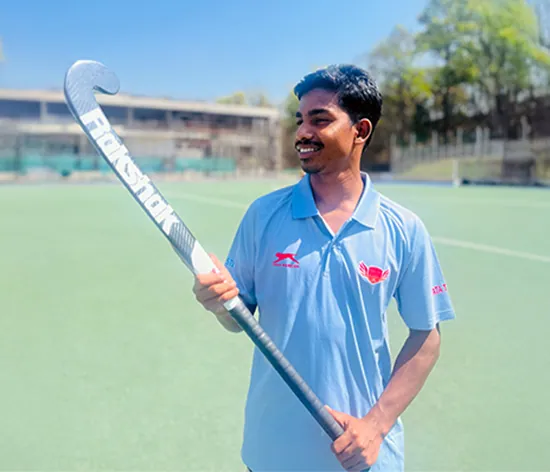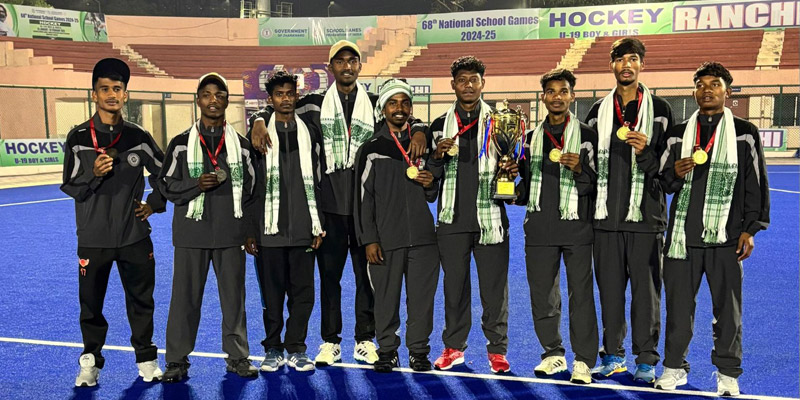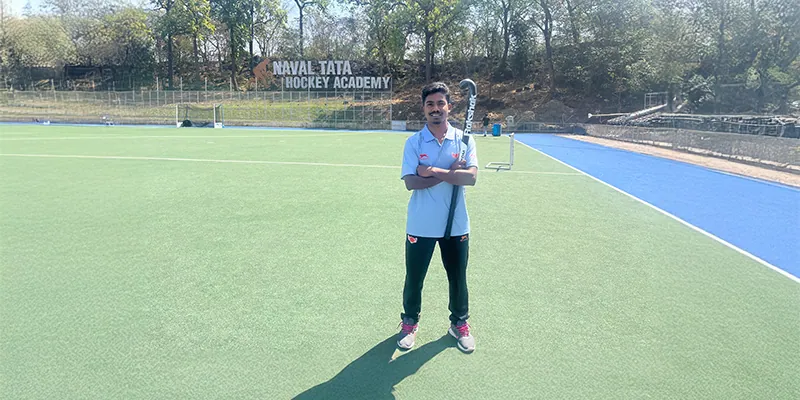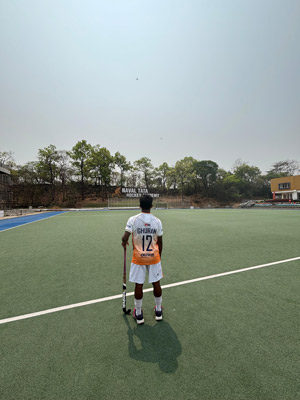
January 2025. On a pleasant day in Ranchi, the teenagers from Jharkhand erupt in celebration. Ghuran Lohra stands at the podium of Ranchi’s Mega Sports Complex, clutching the School Games Federation of India (SGFI) trophy.
It was a hard-fought final against the strong lads of Chandigarh. Just one goal separated them. And that goal had come from him.
Nationals. Nehru Gold. Representing Sub-Junior India in the Netherlands and more. Now, the SGFI Gold. Another feather in the already glittering young career of the midfielder.
“I reflected on my life and wondered how all of it happened. Then, the realisation dawned upon me that I had worked very hard towards it. Hard work has no substitute,” he says.
At 18, Ghuran Lohra has already lived a story most people would call a movie script.
Poverty, rejection, and bullying. The odds were stacked sky-high. But if you ask him what carried him through, he will answer in three words: “Zid hona chahiye.”
You need to be stubborn. Stubborn in your love for your dream. Stubborn enough to keep sprinting when no one else believes where the road will lead.
Ghuran’s story makes you see the word ‘stubborn’ differently. Maybe being stubborn at times isn’t such a bad thing after all.

Born in Konmerla village in the Simdega district of Jharkhand, Ghuran is the second youngest of six siblings. His family owns no land, and his father picks up whatever work he can. Some days, there’s money, and some days, there’s none. He grew up in a home where dreams were luxuries. Some of his siblings moved away to work, sending what little they could.
Ghuran, then four, had no idea what hockey was. He played football at school until a coach told him to try hockey instead.
“I used to be scared,” he says. “Of the stick. Of the hard ball. I didn’t like the sport.”
But soon, like many in Jharkhand, the sport became a part of him. The problem? He didn’t have a hockey stick or a ball, so they made their own: burned plastic or rolled cloth for a ball and wooden sticks that his father helped shape for a bat.
No one protested from the family. Did they see a spark? Unlikely. But they supported whatever made their child smile.
The first leap
Ghuran’s school had barely any facilities. A dusty ground, wooden sticks and a dozen hopefuls chasing one ball. But the coach did what he could. Sometimes, he would lend his own hockey stick, a moment all the kids waited for.
Back then, Ghuran had no hockey heroes. Hockey wasn’t something he watched or could afford to. It was something he did because it gave him joy. Still, their coach would sometimes gather the kids around to watch India’s national team play on TV.
“I remember those matches, but I don’t recall many names. I just watched and enjoyed,” Ghuran says. “But as I grew older, I became a big fan of Hardik Singh.”
The Indian midfielder, a two-time Olympic bronze medallist, became his icon. Today, Ghuran dreams of doing the same — winning medals for India.
The turning point came when he was around 10. He cleared the trial for the Tata Trusts-supported CInI’s grassroots hockey programme in the village. For the first time, he saw cones. Every player had their own ball. That felt like luxury.
“That felt like a big upgrade,” he says. “I could finally work on my skills properly.”
He began training twice a day, balancing schoolwork and chores with growing ambition. As he got better, he earned a spot at the CInI Regional Development Centre (RDC) in Simdega City, joining its very first batch in 2018.
The RDC was 32 km from his home, an impossible distance without support. But CInI stepped in and arranged transport, making weekend turf sessions a reality. His weekdays were still spent on the mud village ground at the grassroots.
The first time he stepped onto a turf, everything felt unfamiliar.
“I had never seen a turf before,” he recalls. “It felt like a different game altogether. The ball moved faster. My shoes kept slipping. The speed, the grip, the bounce — everything felt alien.”
But he didn’t take long to adjust.
“I had to,” he says. “By then, hockey was my only ambition.”
His coach at RDC, Suraj Kerketta, noticed that hunger right away.
“Ghuran had very strong determination and took extra effort to learn the skill of the game,” he recalls. “He was the only one who would ask questions about the training in the group. Because of this, his development as a player has progressed rapidly.”
However, the road to RDC had its thorns. Ghuran pauses and recalls. His voice stumbles, words harder to find. Just before RDC came a dark chapter. One that he struggles to speak of.
Hardships to much harder times…
During his days at the grassroots, he had heard about an institution in Simdega city. It had good hockey coaching facilities and infrastructure, so he decided to attend, even if it meant living away from home.
The family couldn’t afford it.
“I was stubborn,” Ghuran says. “I may be a child, but I knew I had to move beyond grassroots to excel.”
His father, desperate to support his dream, sold some of their home’s khapras — clay roof tiles — to pay for it.
But the experience of living there broke him. He was bullied and humiliated. Some of what happened, he still can’t speak of.
“It was horrifying,” he says quietly. “I couldn’t last more than six months.”
Then came 2018. And with it, his chance at RDC and support from Tata Trusts-CInI.
Rejections to glory
At Simdega's RDC, Ghuran thrived. His skills improved, and his confidence returned. Soon, two players from RDC were picked to play in the Nehru tournament at the Naval Tata Hockey Academy (NTHA), Jamshedpur. Ghuran was one of them. That changed everything.
He saw what NTHA had. “It was a different world,” he says.
Professional coaching. A gym. Balanced meals. Study-friendly hostels. A dream turf.
Everything he had only imagined and more.
He made up his mind: “I want to be here. It was unbelievable at that point.”
But getting into NTHA wasn’t easy. He gave the trial and got rejected — not once, not twice, but three times. Three rejections and even his family’s patience level thinned. The travel to Jamshedpur was expensive, but he managed to convince them.
Ghruan felt the sting of rejection. But he also felt something stronger — belief.
“Every rejection made me more determined,” he says. “Of course, I would be upset, but I knew I was good. If others can, why can’t I? I would return to RDC, ask the coaches what I lacked, and work on it. Every single time.”
Finally, in 2021, he made it.
“All those people in the village who used to mock me… they got their answer that day,” Ghuran says, a boyish smile creeping in that knows what it means to have the last laugh.

Established by Tata Trusts and Tata Steel to nurture young hockey talent and promote community development through sport, the NTHA in Jamshedpur would soon provide Ghuran with access to a world-class environment designed to transform raw potential into professional-level performance.
Here, Ghuran found a world that once seemed unimaginable: structured training schedules, professional coaches, turf matches, nutrition plans, academic support, and more.
But adapting wasn’t easy at NTHA. Players from different states. Language barriers. Food preferences. There were fights. But once they stepped onto the turf, all that disappeared.
“There were fights, and it took close to two years for us to bond. However, on the turf, it was only hockey then. The sport united us,” he says.
Off the turf, Ghuran began to grow in other ways too. He learned how to eat right, express himself, study consistently, and embrace discipline — lessons that helped him both as a player and as a person. He became faster, smarter, and steadily built a reputation for himself on the field.
Manish Kumar, the head coach at NTHA, speaks highly of his ward: “Players like Ghuran embody the spirit of NTHA — relentless, humble, and hungry to grow. When they join us, many come with raw talent but limited exposure. At NTHA, we focus on nurturing their overall development — technically, physically, mentally, and emotionally. Ghuran’s story is special because he never let failures break him. He kept coming back stronger. Our structured programme, world-class coaching, and holistic athlete care system empower players like him to dream bigger and achieve higher.”
And then, finally, came the moment that made it all worth it.
Team India
 |
| Ghuran Lohra in his India jersey at NTHA Jamshedpur—the very academy that rejected him three times before he finally earned his place.* |
In 2023, Ghuran Lohra was selected for the India Sub-Junior Team’s tour of the Netherlands.
He wore the India jersey, sang the anthem and achieved the rare distinction of representing the country.
“It felt unreal. Some things can’t be explained in words. But I knew I had earned it,” he says, a glint lighting up his eyes.
A quiet joy spreads across his face as he remembers what came next — not on the turf, but back home. When news of his selection made news headlines, the local police and administration felicitated his parents in a public function.
“It meant the world to them. They have gone through so much,” he says with pride. “Most people around us don’t even cross state borders. For them, it was huge. Their son is travelling overseas, representing India.”
The team had a strong outing. They won most matches, except one. A 0–7 loss to a side that had World Cup players. He took that loss as a learning experience.
“Their basics were perfect. Receive and pass. Simple hockey. Beautiful to watch. However, our side did very well on the tour,” he says.
Ghuran returned home with wins, memories, lessons and recognition.
In Konmerla, everyone wants to meet him. Parents use him as an example. They tell their children, “Be like Ghuran.”
 |
| Ghuran Lohra with Dutch forward and Paris Olympic gold medalist Koen Bijen (left) during his tour of the Netherlands.* |
He laughs and shyly admits, “It feels strange but nice.”
He recently returned to NTHA from his village after appearing for his Class 12 board exams. Next, he hopes to pursue a degree in arts. Balancing studies with intense training isn’t easy, but he’s clear that he doesn’t want to compromise on his studies.
Football remains his love. Whenever he can, he plays for warm-ups or just for fun. He’s a striker, of course.
Ask Ghuran what brought him here - from balls made by burning plastics to chasing Olympic dreams, and he will return to that one word again - ‘Zid’.
“Passion and hard work, of course. But I tell everyone: if you love something, go for it. Rejections will come. But zid honi chahiye (You have to remain stubborn).”
Sometimes, zid is enough to change your story.
Ghuran’s journey reflects a broader effort and a vision by the Tata Trusts to nurture grassroots talent in underserved regions. Through its support of initiatives like the CInI grassroots programme and the RDCs, followed by the NTHAs, the Trusts have played a critical role in transforming raw talent into national prospects. For many like Ghuran, these programmes offered not just coaching but structure, opportunity, and belief, contributing to their holistic development.
— As told to Suvajit Mustafi, Tata Trusts by Ghuran Lohra at Naval Tata Hockey Academy, Jamshedpur.
* Photo credit: NTHA Jamshedpur.
